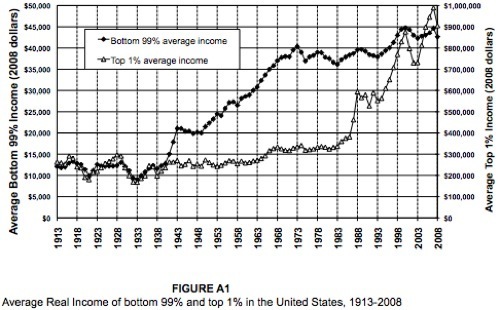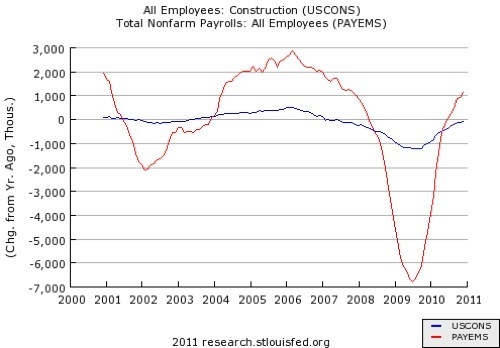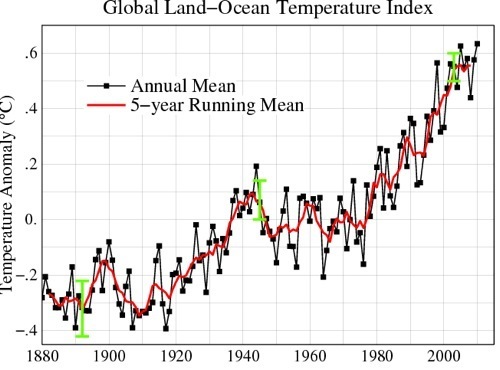J. Bradford DeLong's Blog, page 2114
January 22, 2011
Are You Still Rich If You Spend Your Money Living in a Nice Place?

Hoisted from Comments: Noah writes:
No, This Is Not Surprising...: I wish they would adjust these things for cost of living (or at least housing prices). A family with two $75k earners is middle-class in the Bay Area, but is living high on the hog in Austin, Texas.
But (unless you really like JEN-U-INE Mex-Tex food, and love to go to the Salt Lick and sit outside on those July evenings when the temperature is still 110F at 9 PM) more people would rather live in San Francisco than in Austin: that is why living in San Francisco is so expensive.
Living in a nice place that is expensive because it is nice is one way to spend the money you have when you are relatively rich--it does not keep you from being relatively rich.



Why Oh Why Can't We Have a Better Press Corps? (Peter Baker/New York Times Edition)
Robert Waldmann is annoyed at the New York Times's failure to fact-check Peter Baker and Peter Baker's inability to fact check himself.
Here's Peter Baker:
Obama’s Jobs Search: ACROSS LAFAYETTE SQUARE from the White House is the headquarters of the United States Chamber of Commerce. Last spring, four massive banners were hung on its building spelling out “J-O-B-S,” a message presumably visible from the third floor of the White House, where the president wakes up. By fall, the chamber and Obama were at war during a midterm campaign that ended with repudiation of the president’s party.
“The basic issue here,” Thomas Donohue, the chamber president, told me last month, “is uncertainty — uncertainty on what health care is actually going to cost, uncertainty on hundreds of rule-makings in the Dodd-Frank bill, uncertainty about what’s going to come out of the E.P.A. putting through what they couldn’t get legislatively, uncertainty about taxes.”
The health care program and the financial-regulation law sponsored by Senator Chris Dodd and Representative Barney Frank were bad enough, as far as the chamber was concerned. But Obama’s periodic forays into populism made it personal. He couldn’t seem to decide whether he was going to take Wall Street to task for its irresponsible behavior or cajole it into freeing up money to get the economy moving. One day he derided “fat-cat bankers” who caused the recession; another day, he soothed them by saying that he and the American people “don’t begrudge” multimillion-dollar bonuses...
Robert Waldmann:
Robert's Stochastic thoughts: [Baker's] claim "he soothed them by saying that he and the American people 'don’t begrudge' multimillion-dollar bonuses." is false.... I quote the context of the two words TWO Words ! which Baker ripped out of context.
Q Let's talk bonuses for a minute: Lloyd Blankfein, $9 million; Jamie Dimon, $17 million. Now, granted, those were in stock and less than what some had expected. But are those numbers okay?
THE PRESIDENT: Well, look, first of all, I know both those guys. They're very savvy businessmen. And I, like most of the American people, don't begrudge people success or wealth. That's part of the free market system. I do think that the compensation packages that we've seen over the last decade at least have not matched up always to performance. I think that shareholders oftentimes have not had any significant say in the pay structures for CEOs...
Obama said that the US people don't begrudge success or wealth as such, however, wealth based on Wall Street compenstation packages have no justification. Just to make it absolutely clear that Baker libeled Obama, I will also report the follow up question and answer:
Q Seventeen million dollars is a lot for Main Street to stomach.
THE PRESIDENT: Listen, $17 million is an extraordinary amount of money. Of course, there are some baseball players who are making more than that who don't get to the World Series either. So I'm shocked by that as well. I guess the main principle we want to promote is a simple principle of "say on pay," that shareholders have a chance to actually scrutinize what CEOs are getting paid. And I think that serves as a restraint and helps align performance with pay. The other thing we do think is the more that pay comes in the form of stock that requires proven performance over a certain period of time as opposed to quarterly earnings is a fairer way of measuring CEOs' success and ultimately will make the performance of American businesses better...
Baker falsely asserts [this interview] shows Obama soothing Wall Street executives, [but instead] he advocated regulation of compensation...



Thomas Jefferson Believed the Federal Government Could Regulate "Inactivity"
Rick Ungar:
Thomas Jefferson Also Supported Government Run Health Care: In response to my earlier piece on “An Act for the Relief of Sick and Disabled Seamen”, the 1798 law revealing that a number of our founders were more supportive of the notion of mandated health coverage and a government run hospital system than some may have imagined, many have noted that it is not surprising that such legislation would have been signed into law by President John Adams, a noted Federalist....
Greg Sargent, today reports that it wasn’t only John Adams who supported the notion of government run health care. According to Georgetown University history professor and noted historian of America’s early days, Adam Rothman, Thomas Jefferson –the iconic hero of the Tea Party – also supported the legislation. Sargent reprints the following email he received from Prof. Rothan on the subject –
Alexander Hamilton supported the establishment of Marine Hospitals in a 1792 Report, and it was a Federalist congress that passed the law in 1798. But Jefferson (Hamilton’s strict constructionist nemesis) also supported federal marine hospitals, and along with his own Treasury Secretary, Albert Gallatin, took steps to improve them during his presidency. So I guess you could say it had bipartisan support.
Ezra Klein adds to the debate pointing out that:
...it was a payroll tax that all sailors on private merchant ships had to pay, and in return, they were basically given access to a small public health-care system. But it was, in essence, a regulation against a form of inactivity: You were not allowed to not do something, in this case, pay for sailor’s health insurance.
There are those who will continue to argue that these indications of how the founders viewed these issues in their own time do not necessarily resolve the issue as to how we may, Constitutionally speaking, proceed with reforming the health care system of today.
They may well be right.
But, at the least, can we not agree that the mounting evidence as to how men like Jefferson and Adams perceived the issue should bar the attempt to pin the objections to health care reform on the backs of the nation’s founders?...



No, This Is Not Surprising...

S.D. of the Economist asks a question:
S.D.: The rich in America: Who's rich?: [A]nother thing that I, at least, was struck by when I looked at the Saez-Piketty data was the thresholds for being in the top 10% and 5% of the American population.... To get into the top 5%, you need to earn less than $150,000. To me, it's something of a wake-up-call to realise that a couple who make $75,000 each are in the top 5% of American households. I'm curious whether this is surprising to others, too? Would you, like me, have guessed the thresholds were higher? Does this change what you think about who is "rich" in America today?
It is not surprising, that is, if you keep your eyes open and criss-cross either urban or rural America. It is not surprising if you channel-surf cable TV and think about the advertisements that you watch and understand that advertisements are aimed at attracting disposable income dollars...



Why We Don't Believe that the Fact that We Had too Many People Working in Construction in 2007 Has Much to Do with Our Current 10% Unemployment

The arithmetic simply does not add up.
We had a construction cycle, but a simple shift of demand from construction to other sectors and the shifting of labor out of construction and the process of retraining construction workers for other occupations does not produce the more than six million fall in payroll employment from mid-2008 to mid-2009.
It simply does not.



Why Oh Why Can't We Have a Better Press Corps?

Joshua Green writes:
Bad Climate for Global Warming: Last week, the National Oceanic and Atmospheric Administration and NASA's Goddard Institute for Space Studies announced that 2010 had registered as the hottest year on record. Nothing new here: nine of the last 10 years have been among the warmest ever.
The news highlighted one of Washington's biggest failures over the last two years: its inability to advance climate legislation...
Now let's stop right now. The inability to advance climate legislation wasn't "Washington's" failure: it was a failure of Republican legislators, their tame hacks and propagandists, the carbon-energy lobby, and coal-state Democratic legislators.
Joshua Green knows who the culprits are as well as I do. But for some reason he does not believe he can say so in his lead.
Why not, Joshua? Why not?
Why oh why can't we have a better press corps?
Here is the full piece:
Bad Climate for Global Warming - Joshua Green - Politics - The Atlantic: Last week, the National Oceanic and Atmospheric Administration and NASA's Goddard Institute for Space Studies announced that 2010 had registered as the hottest year on record. Nothing new here: nine of the last 10 years have been among the warmest ever.
The news highlighted one of Washington's biggest failures over the last two years: its inability to advance climate legislation. It was also a grim reminder that things could get worse. Some crucial policy areas have always been neglected and some initiatives stalled. But rarely has a first-order concern like the nation's climate and energy policy actually regressed -- and so dramatically as we've seen since the last presidential election.
Not long ago, it appeared likely that the United States would take meaningful action to mitigate climate change. In the 2008 presidential campaign, both Barack Obama and John McCain touted plans to limit carbon emissions under a cap-and-trade scheme. Even Sarah Palin supported the idea. Much of the business community did, too. Adding momentum was the recent Supreme Court ruling, in Massachusetts vs. Environmental Protection Agency, that required the EPA, under the Clean Air Act, to regulate harmful greenhouse gas emissions. Lawmakers, it was presumed, would take the matter into their own hands rather than cede that authority.
Of course, this didn't happen. Over the strenuous objections of Republicans and coal-state Democrats, the House of Representatives passed a cap-and trade bill in 2009 that met an ignominious death in the Senate. Along the way, cap-and-trade -- originally a conservative idea -- came to be vilified as "cap and tax'' and regarded by a substantial part of the conservative base as a form of fascist oppression. Today, fewer Americans believe in the reality of global warming than did so two years ago, and many took out their wrath last November on Democrats who'd supported a climate bill.
But this doesn't capture the full scale of the setback. Since that debacle, momentum in Congress has shifted strongly against climate-change legislation. If you want to frighten one of the remaining Democrats, suggest that he or she take another shot at passing cap-and-trade.
There's still the EPA. When both parties favored cap-and-trade, this option was viewed as the less desirable one. The agency could limit greenhouse gas emissions, but not through a system as flexible and efficient as cap-and-trade, which included simple improvements like building-efficiency standards that lay beyond the agency's remit. EPA regulations would thus be less effective.
The cap-and-trade bill that passed the House aimed to reduce emissions 17 percent by 2020 from their 2005 levels. A World Resources Institute study found that the most aggressive implementation of EPA regulations would only reduce emissions by 12 percent in that time frame. Scientists say reductions of 36-48 percent would be necessary to halt global warming. "Having EPA set carbon-pollution reductions was everyone's second choice for slowing global warming,'' said Daniel J. Weiss, director of climate strategy at the Center for American Progress Action Fund. "It was like 'In Case of Congressional Gridlock Break Glass.' ''
Now, the backup plan is the only plan, and "aggressive'' regulations are off the table. Last year, the EPA issued a "tailoring rule'' signaling how it intended to proceed. The results in no way resembled the fears expressed by many detractors that a burdensome new system of regulations would be imposed on small businesses. Instead, the EPA will confine its attentions strictly to the largest polluters, such as power plants, oil refineries, and chemical manufacturers.
These modest steps won't do nearly as much to slow global warming as the other, broader plans. But because the battle has shifted from the legislative to the regulatory front, the EPA nonetheless finds itself under attack from the newly empowered Republicans. One of the first things they will do is try to block EPA from establishing pollution standards, possibly by denying funds or refusing to raise the debt ceiling unless the process is slowed or halted.
It's not clear whether they'll succeed. But given the heightened importance of stronger restrictions, environmentalists can't feel good about recent developments. Earlier this week, the Obama administration said it would focus on eliminating regulations, rather than strengthening them. That's probably an accurate reading of the political climate. But for the planet's climate, it's yet another blow.



Comments on Doug Irwin: Peddling Protectionism: Smoot-Hawley and the Great Depression.
PUP:
Irwin, D.A.: Peddling Protectionism: Smoot-Hawley and the Great Depression.:
"An astute and well-told account of a law more often invoked than understood, Irwin's examination of the Smoot-Hawley Act explains how--for good or ill--Congress lost its credibility as a maker of trade law. A valuable book for anyone who wants to understand the Great Depression and whether it could come back."
--Eric Rauchway, author of Blessed Among Nations and The Great Depression and the New Deal: A Very Short Introduction
"Douglas Irwin's elegant and sophisticated account of the Smoot-Hawley Tariff clears up some powerful and persistent myths. As Irwin shows, the tariff didn't begin with congressional logrolling (though that contributed substantially to the eventual outcome), it didn't cause the stock market panic of October 1929, and it didn't cause the Great Depression (but neither did it counteract deflation from abroad as some Keynesians and monetarists have claimed). And many of the book's details are fascinating and even bizarrely amusing."
--Harold James, Princeton University
"Economists and economic historians have closely examined the Smoot-Hawley Tariff over the past few decades, but no one before Douglas Irwin has pulled together such a wide-ranging body of evidence to give us a solid and detailed understanding of the passage and impact of the bill. Understanding the Great Depression has become even more important since the global financial crisis, and that makes this book very timely. Brief, accessible, and clear, Peddling Protectionism should appeal to a wide range of readers."
--Robert Whaples, Wake Forest University
"It would not surprise me if this became the definitive economic history of the Smoot-Hawley Tariff. Synthesizing and fleshing out the best research and nicely connecting economics and politics, Peddling Protectionism provides a fuller accounting of, and a deeper perspective on, what is arguably the best-known U.S. tariff of the twentieth century."
--Kris Mitchener, Leavey School of Business, Santa Clara University
Damned if I can think of who the "Keynesians and monetarists" are who claimed that Smoot-Hawley was stimulative by "counteract[ing] deflation from abroad." I was always taught by Keynesians and monetarists that Smoot-Hawley and retaliative moves by other countries together administered a contractionary supply shock to the world economy--although not one big enough to make the Great Depression great...



Perhaps I Should Give More Tests...
Jeffrey D. Karpicke and Janell R. Blunt:
Retrieval Practice Produces More Learning than Elaborative Studying with Concept Mapping: Educators rely heavily on learning activities that encourage elaborative studying, while activities that require students to practice retrieving and reconstructing knowledge are used less frequently. Here, we show that practicing retrieval produces greater gains in meaningful learning than elaborative studying with concept mapping. The advantage of retrieval practice generalized across texts identical to those commonly found in science education. The advantage of retrieval practice was observed with test questions that assessed comprehension and required students to make inferences. The advantage of retrieval practice occurred even when the criterial test involved creating concept maps. Our findings support the theory that retrieval practice enhances learning by retrieval-specific mechanisms rather than by elaborative study processes. Retrieval practice is an effective tool to promote conceptual learning about science.



Why Oh Why Can't We Have a Better Press Corps?
In my email inbox this morning, apropos of the New Yorker:
All the little details are off. Cloudberry gelato isn't a thing. (Cloudberry sorbet maybe). The stuff about yuppie women doing workouts that emphasize the upper body... surely he could have read the wikipedia entries for pilates or spinning. Sometimes I wonder if [David Brooks] knows any actual people, or just bases his writing on cliches he picks up on the internet...
So I went and checked:
David Brooks: What the science of human nature can teach us: High-status women, on the other hand, pay ferocious attention to their torsos, biceps, and forearms so they can wear sleeveless dresses all summer and crush rocks with their bare hands.... Occasionally, you meet a young, rising member of this class at the gelato store, as he hovers indecisively over the cloudberry and ginger-pomegranate selections, and you notice that his superhuman equilibrium is marred by an anxiety...
Indeed yes: "cloudberry gelato" produces only six hits on google. "cloudberry sorbet" produces about "about 1,000".



Liveblogging World War II: January 22, 1941
From On War:
Wednesday, January 22, 1941: In North Africa... The remainder of the garrison of Tobruk surrenders after demolishing some of the harbor facilities. There are 27,000 prisoners. Much equipment is also captured and in fact it will prove possible to put the port into service fairly quickly. The Allied casualties have been less than 500 men.



J. Bradford DeLong's Blog
- J. Bradford DeLong's profile
- 90 followers



